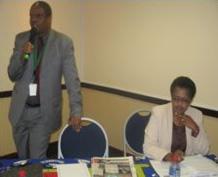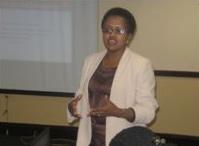Addressing Health Determinants in Swaziland: Strengthening the coordination role of the Ministry of Health
Mbabane, Swaziland, 4-6 July 2011 -- The WHO Swaziland Country Office, supported by WHO AFRO Social and Economic Determinants of Heath Unit Representative Dr Chandralall Sookram facilitated in the first of its kind national workshop to address social determinants of health in Swaziland.
This workshop was a milestone, a meaningful translation into action and an ostensible operationalization of the strategy to address the key determinants of health in the African Region. The strategy was adopted by the Regional Committee for Africa in 2010 and Swaziland is among the first few countries in the region to begin implementation.
The national workshop targeted major government sectors, the academia, Non Governmental Organizations (NGOs) the National Nurses Association and the private sector, among key stakeholders. In attendance were the Directors from the Ministry of Health, Ministry of Agriculture, Ministry of Works and Transport, Ministry of Labour and Social Security, Ministry of Youth and Sports, Ministry of Tourism and Environment, Ministry of Justice; and the Ministry of Housing and Urban Development.
The Dean of the Faculty of Health Sciences and a representative from the Environmental Health Department and the chairperson of the health portfolio committee in the House of Assembly in the parliament of Swaziland were also intendance. These senior officers were targeted because of their central roles in policy development in their sectors. Engaging leaders and policy-makers at all levels of government was intended to emphasize the centrality of their roles as they help to bring their influence to bear in pursuit of the agenda to address the tenets of the social determinants of health in their respective sectors.
The message for the workshop, which message was deliberately coiled to reverberate throughout all the agenda items of the programme, was that “Government objectives are best achieved when all sectors include health and well-being as a key component of policy development”.




